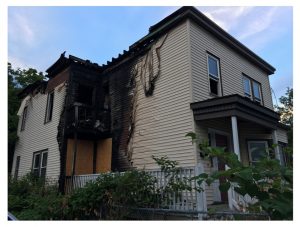Like it or not, your credit score probably affects how much you pay for financial products and services than any single characteristic. Use of consumer credit information extends well beyond the traditional uses of loan underwriting.
Of the 10 home and auto insurers we represent, 8 use “insurance scores” – a variation of a consumer credit score – as a rating factor. Another considers credit information when underwriting. Only 1 of the 10 does not consider credit information.
Insurance companies have proven a strong correlation between higher credit scores and lower insurance claims. Most state regulators – including Maine’s – have agreed that insurers may offer lower rates to people with better scores – and higher rates to those with lower scores.
You Don’t Have to be Rich to Have a Good Credit Score
Contrary to popular opinion, income and savings are not factors in determining your credit score. It’s about managing finances: paying bills on time, being prudent with debt, and building credit.
A wealthy person who doesn’t use credit cards, has no car loan or mortgage, but who is sloppy about paying monthly bills probably has a worse score than someone of modest means who manages and pays debt prudently.
Tips to Improve Your Score
1. Get a copy of your credit report. They are available free once a year from each of the three major credit reporting agencies. However, you must use this web site rather than the individual agencies’ sites to get the free reports.
Check your report for errors, omissions and potential identity theft. Make sure that all your loans are shown; you want to show that you are good at managing all your accounts. Paying bills on time is critical to a good score.
2. Manage credit cards properly. If you don’t pay off your card every month, pay it down to less than half the maximum available balance.
Taking out new credit cards is a good way to drag your score down. Don’t take on a new card unless the interest rate A LOT lower and you plan to pay it off within the year.
3. Don’t cancel a credit card once you’ve paid it off – this surprises most people. Cut it up if you don’t want to use it, but don’t cancel it. Your credit score rewards longevity and restraint in using available credit.
4. If you plan to apply for credit in the near future, don’t use credit cards for groceries and other routine payments. Credit rating companies only see the balance on the day they check. They don’t know if you pay it off every month or not.
Of course, other factors -claims history, for example – affect your insurance costs. A clean driving record will lower your auto insurance costs; buying more coverage, or insuring a more expensive car will increase them. A larger home, or one without a nearby fire hydrant, will be more expensive to insure. But insurance score can play a surprisingly significant role in the price you pay for insurance. Managing yours can help you to control your costs.
For more information, call Noyes Hall & Allen Insurance.


 Your Landlord’s Insurance Doesn’t Cover You
Your Landlord’s Insurance Doesn’t Cover You